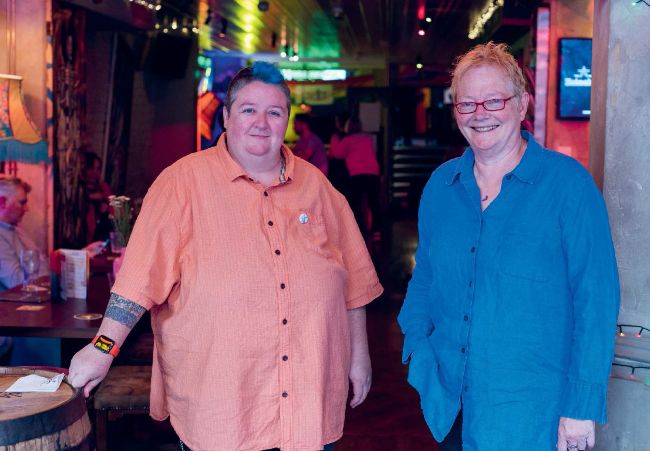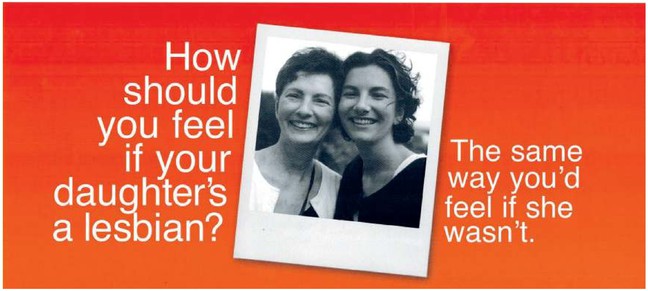Herstory In The Making
Having repeatedly noted a dearth in representation of the Irish lesbian experience on the screen, the makers of a new documentary showing at this year’s GAZE decided to take matters into their own hands. The result is Outitude, a ilm that is as grassroots as the lesbian movement it charts, as director and producer Sonya Mulligan and Ger Moane, tell Aoife O’Connor.

Photo by Babs Daly.
A grassroots documentary born from the fundamental question of ‘where are we on the screen?’, Outitude charts the history of the Irish Lesbian Community from all the way back in the 70s to the 2015 marriage referendum. Produced by an all-female, all-queer team, the documentary features interviews with some of Ireland’s most notable lesbians (Nell McCafferty and Ailbhe Smyth to name a few), and paints an emotional picture of a community connected by their fight for equality. Director Sonya Mulligan and producer/researcher Geraldine Moane sat down for a chat with GCN in preparation for the film’s premiere during GAZE 2018.
Where did ‘Outitude’s’ journey start for you?
Sonya: guess it actually came from GAZE. We’d go every year, and every year we were thinking, ‘Where is our story? Where are we on the screen?’ So, thought, ‘Here am saying where’s our story, why am not making it?’
“We wanted to get those stories out there before they’re lost. Those women from the early days are getting older.
Ger: We got a lot of feedback from people who thought this was a really great project and that it was important to do. That they really wanted to see it happening.
The history of the Irish lesbian community is a pretty huge subject to try and tackle. What was your process in terms of deciding what the film’s perspective would be?
G: We didn’t want it to be Dublin centered, that was a big thing. We also didn’t want to only be campaign-based, because a lot of what is done is only oriented towards campaigns for decriminalisation or for marriage equality. We looked at the rest of the picture.
S: We wanted to capture lived experiences rather than activists.
You chose to include Northern Ireland, who are still fighting for marriage quality, as part of that all-island history.
S: It was interesting for us to talk about a country at war, and the different tensions in the community because of that. Even though there were two very opposing sides in Northern Ireland, the gay community came together and it was more mixed and more fluid across the boundary.
G: The LGBT community has always had a lot of divisions that other people don’t see.
Along the journey, charting these divisions and themes, did you hit any focal points that you weren’t expecting?
S: Initially we had thought it was going to be a narrative timeline, but very quickly we realised that themes like homophobia and identity were emerging. This is a different view that we’ve never seen before. Often a lot of the stuff on homophobia in print and on screen shows gay men being beaten up in the street, but there were all these stories that women started telling us of their experiences. We had one woman who was in the Charismatic Movement in the ’70s. It was a religious organisation, and a priest offered to cure her by putting her through all these rituals. It was horrific to hear and very emotional.
G: There were several physical assaults. Almost half the interviewees talked about that.
S: And guards just ignoring them, saying, ‘well what do you expect?’ These are stories that we haven’t heard a lot about. That felt like a really powerful thing to be able to share.
G: Another surprise was how interconnected everything is around the lesbian and gay rights movements. Back in the ’70s and ’80s when everything was starting with Women Against Imperialism, the Irish Gay Rights Movement, Liberation for Irish Lesbians – everything was moving around the same space.
You got that feeling of everyone encouraging each other and realising they were all part of something bigger.
Do you feel like there’s a huge difference between the community in the ’70s versus the community now?
S: In the early days there was more of a sense of being oppositional. You were rejecting the status quo. A lot of recent activism feels much more the opposite. It’s different to the early days where it was illegal and you were fighting everything. It felt more like survival politics.
G: Another contrast would have been a huge need to have our own lesbian space and find venues that would allow us to do that. There was a constant shifting of venues because they wouldn’t let lesbians have their events there. Now it’s like there are spaces everywhere.
S: But now it’s like ‘how are we special?’ How do you find your specialness if we’re all the same and we’re all equal?
The film is made up of interviews with so many key figures of the Irish Lesbian Community, telling their stories about the history they’re a part of. In telling a queer story made by queer people for queer people, you’ve produced something truly authentic. How was it talking to these women?
S: All the interviews were really emotional for all sorts of reasons, whether it was about celebrating successes, or just what they had to go through. don’t think there was one interview that didn’t cry at. People were bringing up stories of pain and loss and hurt.
We wanted to get those stories out there before they’re lost. Those women from the early days are getting older. If you’re coming out now there are similarities, but it’s not the same in lots of ways and think it would be a shame to lose that history.

Pictured: Billboard from the Lesbian Education and Awareness (LEA) national campaign, mid-1990s
Having documented the history, what do you feel like the next step is for the Irish lesbian community?
S: The last theme that we deal with in the documentary is, ‘where to next?’ There are lots of different things, and there are people who say, ‘sure it’s fine, now you have equality what’s your problem?’ Well, I’m still afraid to walk home alone at night on my own and there are still issues within families. We even had one interview that we had set up and was all ready and planned, but on the day she just said, ‘I’m sorry can’t do it. don’t want all my neighbors to know, don’t want my community to know’.
G: Even though we keep saying that it’s all changed, and it has, it’s still very difficult to come out as a young person. It’s still dealing with something where you’re saying, ‘I’m actually different from everybody else, this is who am’. Within that there’s a lot of research saying that LGBT youth have a much higher rate of stress issues, self-harm, and suicidal thoughts compared to heterosexual youth. So youth is a huge factor.
Do you have a message for people coming to see the film?
G: There’s a real sense of being uplifted by it, because you’re going to see the whole sense of coming together, fighting for our rights, fighting for space, fighting for identity and making change. S: It’s a snapshot of our very vast and diverse history. We didn’t have a huge budget, we didn’t have a huge team of people, but we have a lot of heart and emotion. It’s not people telling other stories, it’s actually women themselves telling their own lived experiences, that’s the strength of it. These are women sharing stories that they haven’t spoken about before and there are a lot of emotions in it, so bring tissues!
‘Outitude’ shows on Friday, August 3 in the Light House Cinema as part of GAZE: The Dublin International LGBT Film Festival, www.gaze.ie